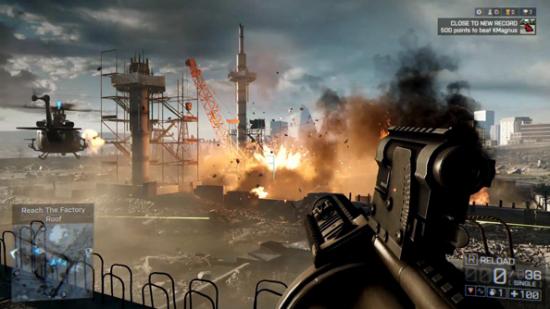Though Battlefield 4 seemed to follow fairly quickly on the heels of its predecessor, gaps remain in the factory line. For every Battlefield, two Call of Dutys drift by. And if EA’s chief money man is to be believed, that’s how things will remain.
Speaking to an analyst during this week’s UBS Global Technology Conference, EA CFO Blake Jorgensen outlined some of the reasons why a yearly Battlefield would be bum.
“The challenges are you’ve got to most likely do it out of two studios because it’s hard, it’s a two-year project,” he said. “Battlefield takes us about two years to develop and so you want to make sure that you’re sharing talent across studios, so you keep core talent of the product and the experience for the consumer there.”
DICE is now two studios, since the Swedish games corp opened new offices in LA. But rather than set the LA contingent to work on a different game, management have tasked them with contributing to map packs like the upcoming Second Assault DLC. Despite the large operation, that’s a clear contrast to the one-two punch of Treyarch and Infinity Ward, plus the host of other attendant studios necessary to bring Call of Duty to market each year.
Jorgensen went on to point out the struggle to differentiate sequels when each follows the last too closely.
“You want to be really careful that you don’t destroy the franchise along the way,” he said. “You’ve got to make it exciting and different, but at the same time you want to make sure you maintain a great franchise.”
Boringly, Jorgenson also fretted about chopping off Battlefield’s money tail, denying it the digital sales it’s become accustomed to.
“Battlefield is a product that doesn’t just sell once; it sells for 24 months associated with not just Battlefield, but all the additional Battlefield Premium activities that the consumer wants,” he said. “So you’ve got to be careful that you don’t destroy some of that tail that is on the Battlefield product.”
It all makes sense in principle. But even as the arrangement stands, I think Battlefield 4 has failed to stand apart from its predecessor. And while Call of Duty: Ghosts has evidently suffered under time pressure in this transitional year of new consoles, frankly, Battlefield hasn’t fared much better.
Perhaps the strain of working on Battlefield, Mirror’s Edge 2 and a new Battlefront simultaneously is showing on DICE’s brow. So what’s the solution?
